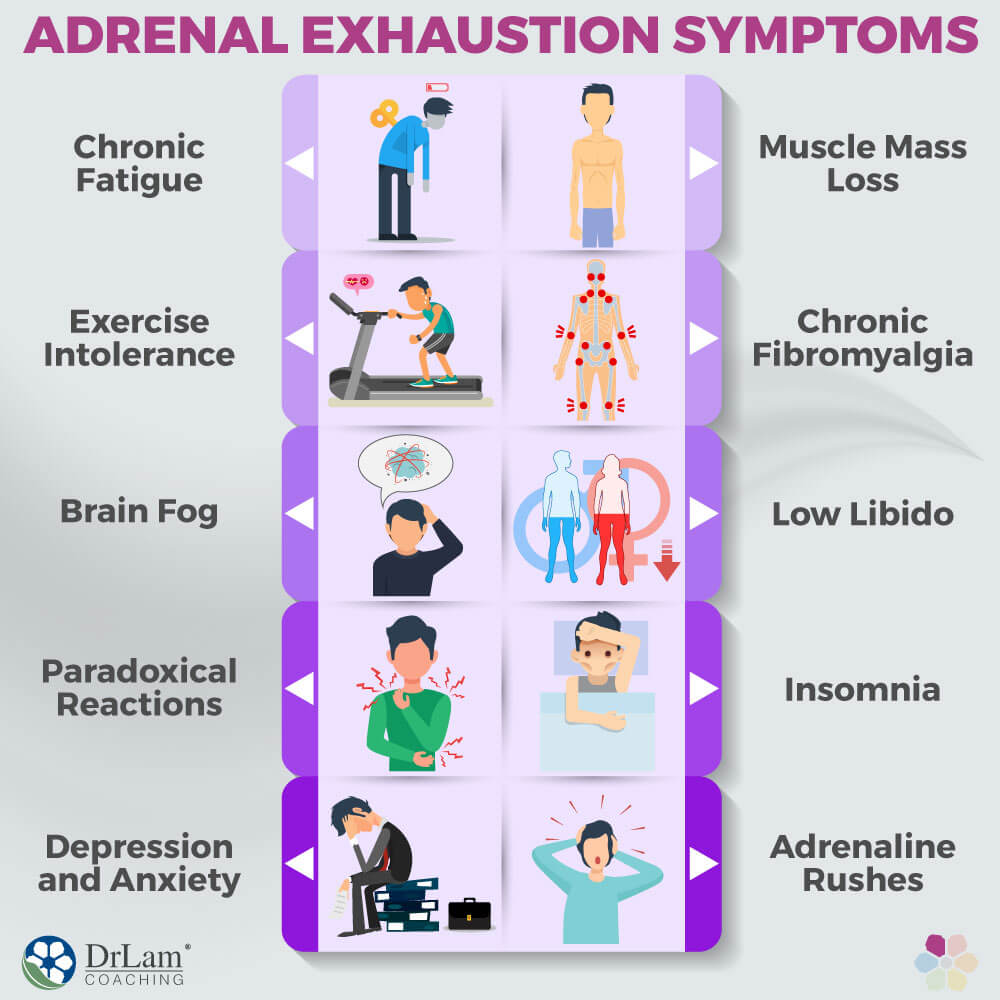 While Adrenal Fatigue is comprised of four stages, the condition is very often unnoticed in the first two stages. It isn’t until Stage 3, named Adrenal Exhaustion, that the symptoms are finally recognized as signs of internal dysfunction. When severe adrenal exhaustion symptoms arise in Stage 3, they are often complicated, interconnected, and confusing—even to health professionals—because Adrenal Fatigue exerts its effects throughout every system in the body. So let’s examine the physiology behind some of these symptoms.
While Adrenal Fatigue is comprised of four stages, the condition is very often unnoticed in the first two stages. It isn’t until Stage 3, named Adrenal Exhaustion, that the symptoms are finally recognized as signs of internal dysfunction. When severe adrenal exhaustion symptoms arise in Stage 3, they are often complicated, interconnected, and confusing—even to health professionals—because Adrenal Fatigue exerts its effects throughout every system in the body. So let’s examine the physiology behind some of these symptoms.
Fatigue is the hallmark symptom of Adrenal Fatigue, but it isn’t simply that the body is running out of energy. A body with Adrenal Fatigue has already been under stress for a long time, to the point that the adrenal glands, which would normally deal with this stress, have deteriorated. So the body resorts to drastic measures. As a survival mechanism, the body conserves energy by limiting energy expenditure, and you feel that as fatigue, especially in the advanced stages.
A side effect of the body’s emergency stress response effort is the body’s metabolism skewing toward a catabolic state in which the body is literally eating itself for energy. This is why the muscles begin to shrink as the constituent protein is mobilized by the body as energy to combat what it perceives as a life-threatening stress.
Another casualty of the body’s condition is the ability to exercise. Exercise has innumerable benefits for health in both the long term and short term, but relies on the body’s ability to expend energy for anabolism, in which the body builds up greater muscle mass and stronger connective tissues. If you are experiencing adrenal exhaustion symptoms, however, when your body tries to respond to exercise, it runs into a brick wall, as it doesn’t want to expend enough energy for the anabolic process. Instead, you experience fatigue.
Fibromyalgia is itself a complex and poorly understood condition. However, many people with Fibromyalgia have underlying adrenal problems, including Adrenal Fatigue. Other issues thought to be related to Fibromyalgia include neuroendocrine imbalances, chronic stress, and depression; these are all issues also linked to, or even caused by, Adrenal Fatigue. While the link between the conditions is still not understood, there is a clear association.
When your body is in energy conservation mode, it reserves most of its remaining energy expenditure for the critical processes such as brain and heart function. Important housekeeping functions, such as metabolite and toxin processing by the liver, are often given secondary priority. As a result, byproducts of metabolic processes are not cleared out of the body as quickly, and they linger in the tissues and blood. The buildup of these unwanted metabolic byproducts, which are sometimes toxic, is thought to affect brain function, causing a feeling of “Brain Fog.”
 Reproductive functions are even lower on the list of priorities when the body is rationing energy. Libido is, therefore, significantly reduced. In women, the menstrual cycle can also be affected, becoming irregular or even completely absent.
Reproductive functions are even lower on the list of priorities when the body is rationing energy. Libido is, therefore, significantly reduced. In women, the menstrual cycle can also be affected, becoming irregular or even completely absent.
Paradoxical reactions can be the most frustrating and confusing symptoms of Adrenal Fatigue. Medicines, herbs, natural compounds, and even sometimes foods affect may your body in a surprisingly negative way, even with substances you’ve consumed often in the past. Examples of paradoxical reactions include an analgesic increasing your sensitivity to pain or a dairy product suddenly triggering an allergic reaction, even though you have been fine with dairy products all your life.
This is caused by the liver slowing down, as mentioned earlier. The liver is responsible for ridding the body or unwanted chemicals. The buildup of toxic byproducts that results from the slowdown is compounded by the buildup of other powerful physiology-altering materials. The byproducts from these compounds are usually more toxic and cause paradoxical reactions as they stick around and reach levels that the body is unprepared to handle.
With the body in an energy conserving state, it would be logical to conclude that sufferers would end up sleeping more. Unfortunately, the reality is quite the opposite. As tired as most people with adrenal exhaustion symptoms are, they have difficulty getting to sleep and staying asleep. The reasons for this are twofold. First, the adrenals are a key regulator of the circadian cycle, which tells our body when it’s time to sleep and when to get up. Without the adrenals functioning properly, the body doesn’t get the message that it should be preparing for sleep. In addition, even in its low energy emergency state, the body devotes resources to keeping alert so that it will be ready to react to any threatening stimuli. This vigilance interferes with your ability to rest.
 Your mood and thought processes are produced in and travel through the brain’s neurons via chemicals called neurotransmitters. The adrenal glands are an integral part of the neurotransmitter system, and the drop-off of adrenal function that occurs in those with Adrenal Fatigue upsets the balance of these chemicals. Neurotransmitter imbalance negatively affects your mood and mental health; you may be unable to feel happy, have anxiety and panic attacks, or fall into depression.
Your mood and thought processes are produced in and travel through the brain’s neurons via chemicals called neurotransmitters. The adrenal glands are an integral part of the neurotransmitter system, and the drop-off of adrenal function that occurs in those with Adrenal Fatigue upsets the balance of these chemicals. Neurotransmitter imbalance negatively affects your mood and mental health; you may be unable to feel happy, have anxiety and panic attacks, or fall into depression.
Cortisol, a hormone produced by the adrenals, is usually used by the body in day-to-day handling of regular, simple stressors. When the fatigued adrenals don’t produce enough cortisol, the difference is made up with epinephrine, also known as adrenaline. This incredibly powerful hormone—responsible for the fight-or-flight response in times of extreme stress or danger—floods the body, giving rise adrenaline rushes for even minor stresses.

This was an overview of some of the major adrenal exhaustion symptoms, but by no means all of them. Behind each of these symptoms, you can see a physiological link back to the root cause–adrenal gland dysfunction. It is important to understand how these symptoms relate to Adrenal Fatigue so that you can recognize that it is not enough to just treat the apparent problems. Addressing the underlying problem—the exhausted adrenal glands—is the only long-lasting solution for those suffering from advanced Adrenal Fatigue.
© Copyright 2016 Michael Lam, M.D. All Rights Reserved.

